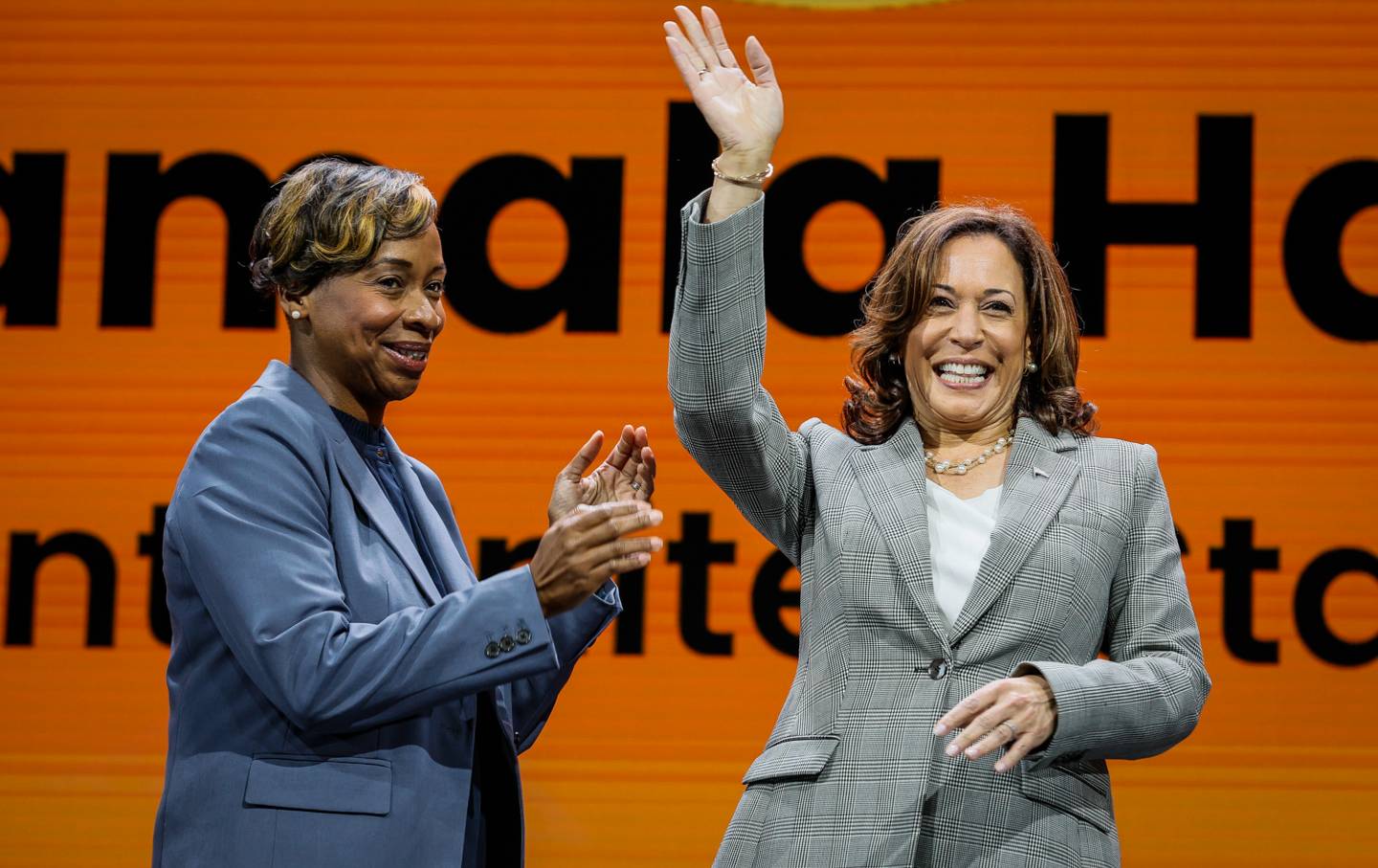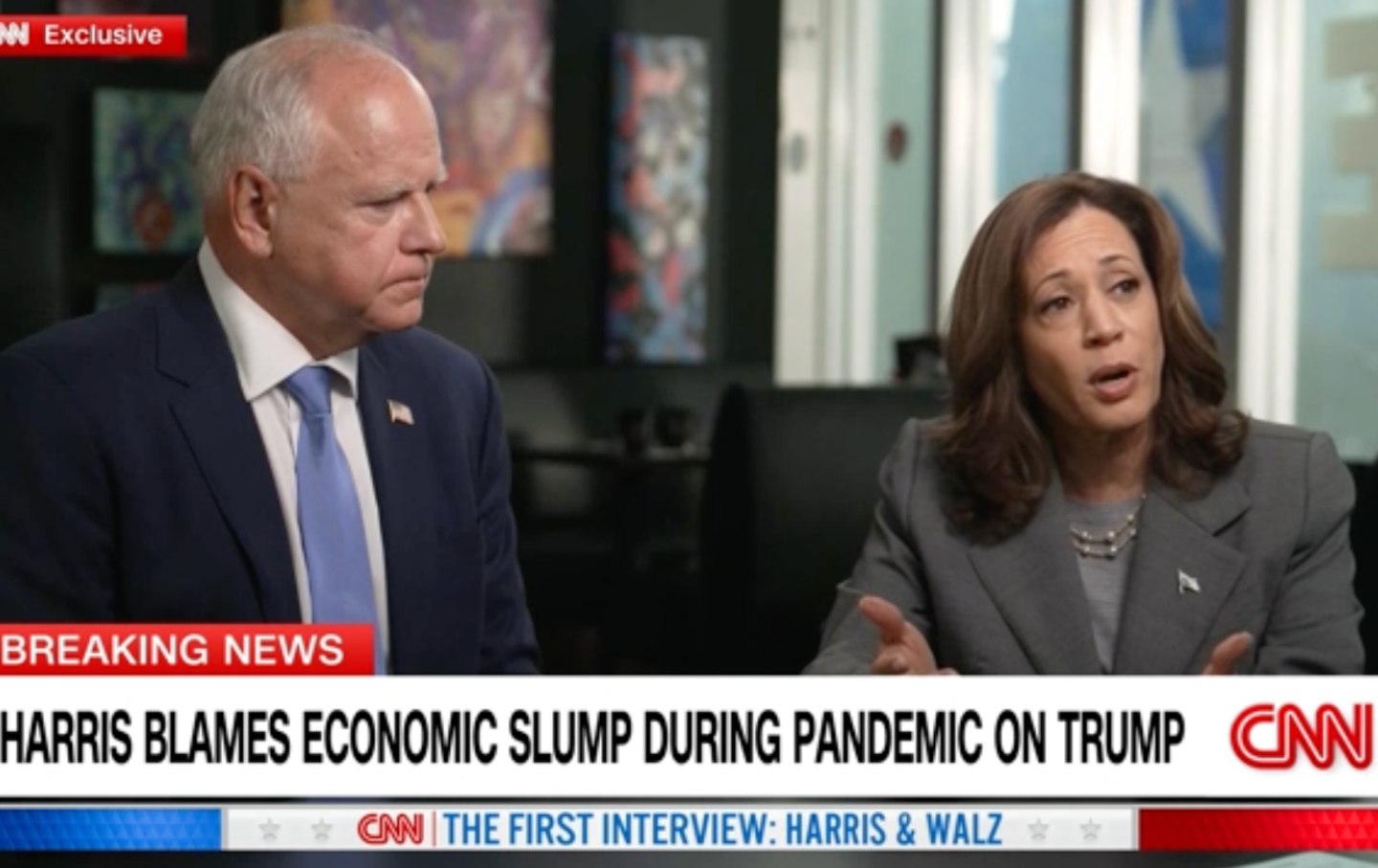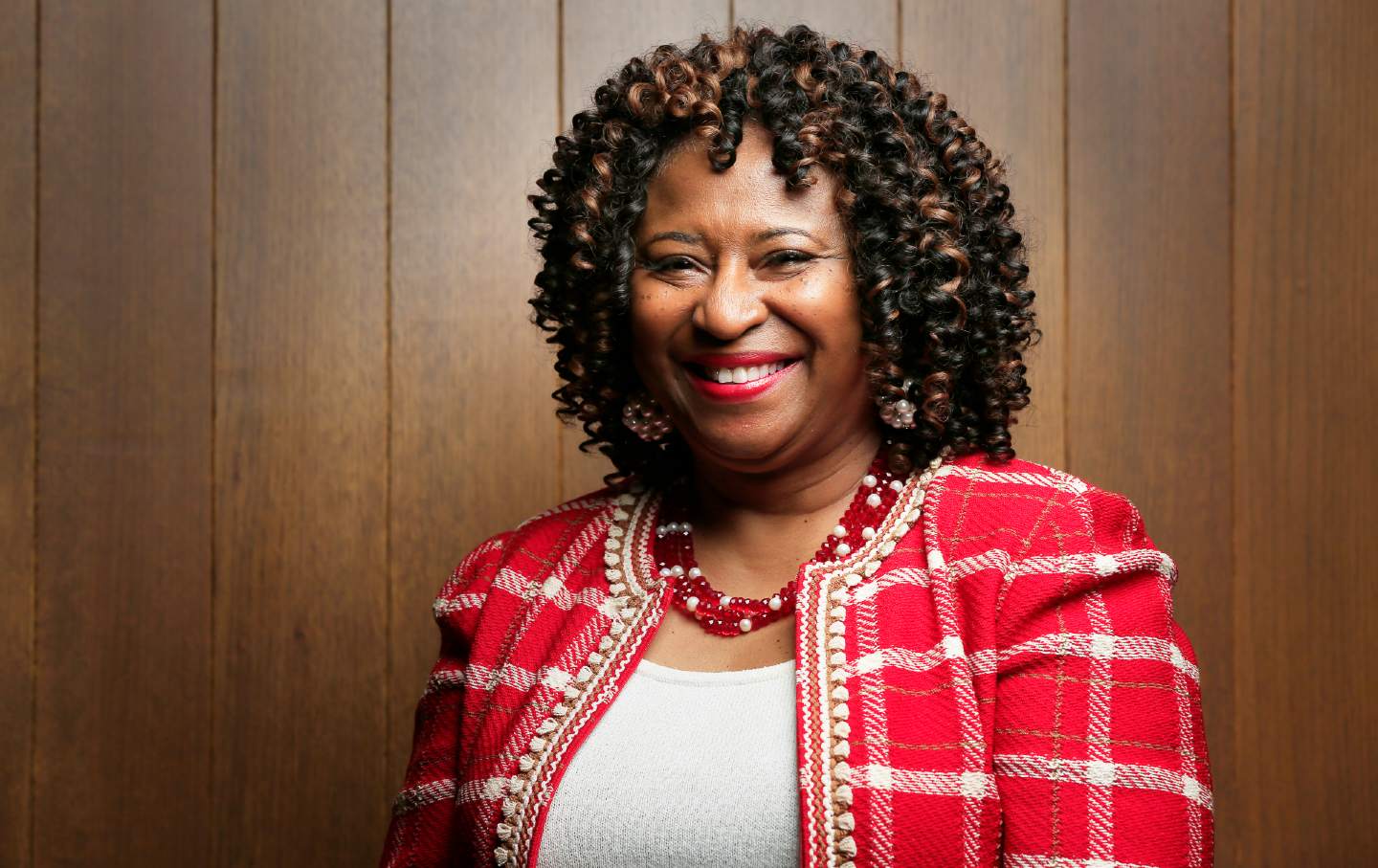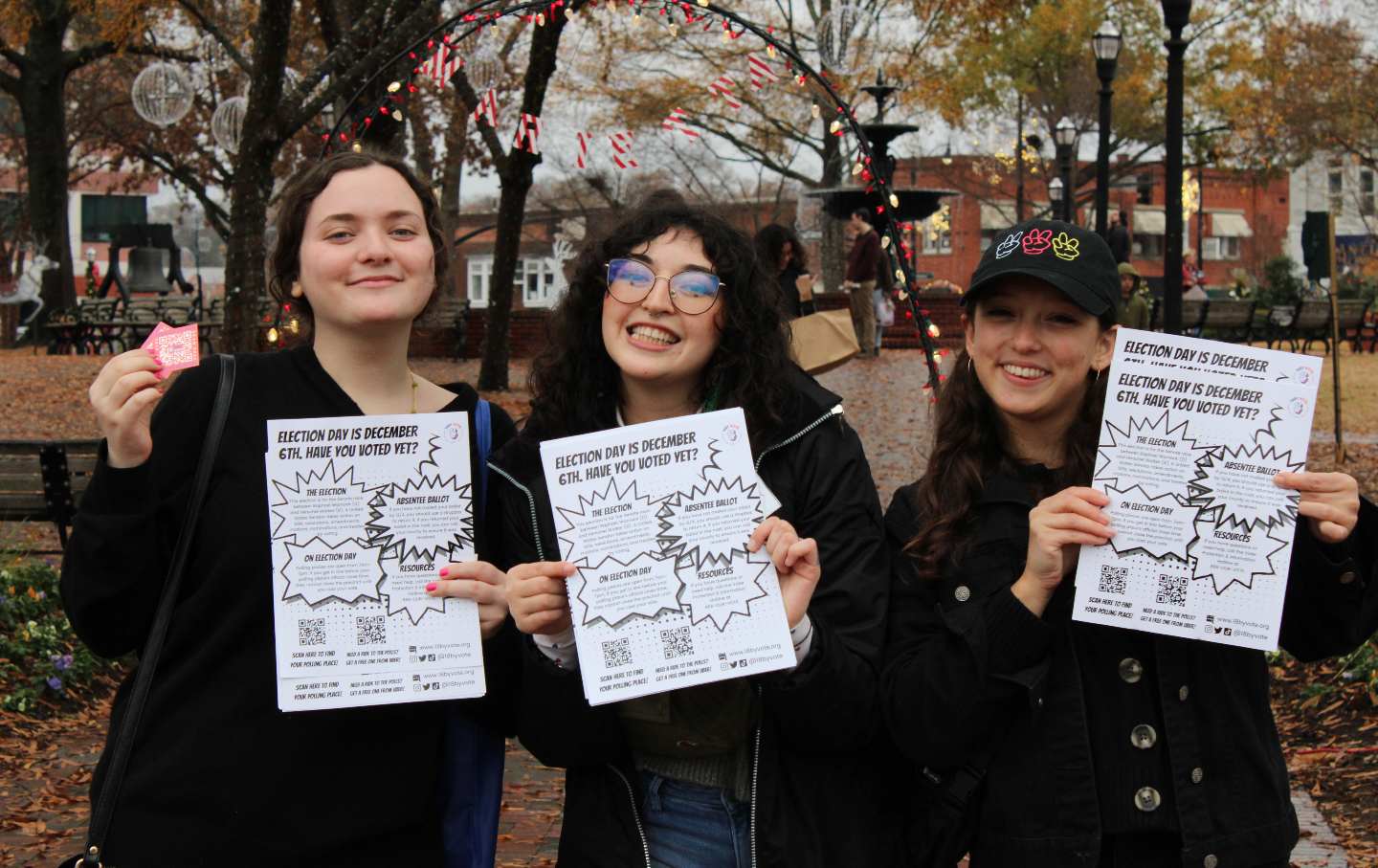
[ad_1]
Politics
/
August 30, 2024
Should Kamala Harris win in November, her attorney general pick will be among her most critical cabinet appointments. Progressives should start organizing now.

The attorney general is the most important cabinet appointment made by a president. I know the media acts like the vice president is the crucial pick, and since that’s the only one we get to know about before the election, the VP choice is important for the presidential campaign. But once the votes are counted (if the Republican Supreme Court allows votes to be counted), it’s the AG who sets the tone for how law and justice will be administered in the new administration.
The choice is particularly crucial because the attorney general is the official with the most independence from the White House. Pretty much everybody else in the cabinet works directly with the president, and implements the president’s agenda through the executive agencies they oversee. Not so with the AG: Once the AG is confirmed by the Senate (and confirmation is apparently not even necessary if you are a Donald Trump pick), he or she has the authority to enforce the laws and bring cases separate and apart from the wishes of the president they nominally work for. The AG is supposed to investigate and prosecute crimes even if those crimes are committed by other members of the president’s government.
Think about it this way: There is rarely any distance between a president’s foreign policy and the secretary of state’s foreign policy; nobody expects the secretary of transportation to announce new airline regulations without consulting the president; but everybody expects the attorney general to take legal actions without checking in first with the president. And if the president (or even a presidential nominee’s spouse) so much as talks to the AG about an ongoing legal matter, that could be a scandal.
We know from reading Project 2025 that a second Trump administration aims to change all of this. As I’ve previously explained, the document explicitly calls for taking away the AG’s independence—a move that stems from Trump’s desire to use the Department of Justice to prosecute his political enemies.
We also know that, should Trump be reinstalled, he plans to pick an attorney general who will be loyal to him—not to the rule of law. Jeffrey Clark, last seen trying to help Trump steal the 2020 election with a fake electors plot, is one possible contender for AG. Texas attorney general and inveterate xenophobe Ken Paxton has also been bandied about as a potential pick. Whomever Trump picks, we know they will be white, loyal, and fascist.
But what of Kamala Harris? People have paid a lot of attention to Harris’s time as a prosecutor and state attorney general, but there’s been less discussion about what kind of prosecutor she would appoint if elected. I would like to hope that Harris will not make the same mistake Joe Biden made when he selected Merrick Garland as attorney general. In Garland, Biden picked a judge, not a prosecutor—and a judge with evidently no ambition higher than “restoring integrity” to the Department of Justice. That’s why Garland ended up being more concerned with the reputation of the DOJ than with the zealous defense of the rule of law.
Current Issue

I have been keeping my ear to the ground, searching for signs that Harris will improve upon Garland and select an AG who is for the people instead of for the department. Here are the names of potential picks that are bubbling to the top.
Letitia James
new york attorney general
Tish James has already accomplished something Garland could not: She got a conviction against the Trump Organization for some of the financial crimes Trump committed. That alone makes her a strong contender to lead the Department of Justice.
James is a former public defender and New York City Council member who attended Howard University (Harris’s alma mater) for law school. She’s been the New York AG since 2019, and unlike the last guy to have her job (Eric Scheniderman), or the guy before that (Andrew Cuomo), or the guy before that (Eliot Spitzer), she has managed to avoid being mired in a gross sex scandal.
Perhaps the most important function of the New York AG’s office, when the officeholder can keep it in their pants, is to serve as the chief regulator of the financial industry. It’s not an accident that James prosecuted The Trump Organization for financial crimes; that is literally her most important job. Getting “tough” on white-collar crime is something the country could use.
James’s successful prosecution of Trump, however, means that she will have the roughest ride to Senate confirmation. Should Republicans lose the upcoming election, they will be apoplectic, and they might look to exact some measure of revenge against James. James can likely be confirmed only if Democrats maintain control of the Senate—and then don’t lose their nerve once back in power.
Andrea Campbell
massachusetts attorney general
Andrea Campbell is a rising star in the Democratic Party. She served as the first African American president of the Boston City Council, lost a race to become mayor of Boston, but successfully ran to be Massachusetts attorney general in 2023.
Longtime readers will remember that briefly, during the summer of 2020, white people became momentarily interested in police reform. For a few weeks, the systemic brutality faced by Black people at the hands of unaccountable police forces gave white folks the sads. It didn’t last (as I predicted it wouldn’t, in real time), but Campbell has never lost the plot. Her career, both on the city council and as AG, has been focused on police reform and accountability. As AG, she has established a number of new special “units” to focus on particular kinds of crime, including a police accountability unit, an elder care unit, and a reproductive rights unit. Campbell has also been an advocate for transgender rights, and she (along with Massachusetts Governor Maura Healy) has promoted new guidelines for universities in the state to encourage diverse college admissions in the face of the Supreme Court’s 2023 decision declaring affirmative action unconstitutional.
Put simply: Campbell has an agenda that goes far beyond mere institutionalism. She is the kind of person who will use the full powers of her office to protect civil rights and civil liberties, and that is the kind of person we need at the DOJ given that we’ll still have a Republican-controlled Supreme Court committed to taking away those rights and liberties.
I don’t have to guess at how Republicans will view that agenda. But Campbell hasn’t prosecuted their savior in chief (yet), so she might be easier to confirm than other potential AG candidates.
Ad Policy
Catherine Cortez Masto
us senator, nevada
Frankly, I was shocked to hear DOJ watchers bring up this name as a potential attorney general. Cortez Masto won reelection to the US Senate from Nevada in a razor-thin election in 2022. The Democrats hold a slim majority in the Senate, so giving up one of those senators—and doing so in a state where the governor is a Republican—feels insane and self-defeating.
One potential reason she’s in the mix: Cortez Masto was one of Harris’s friends and allies when they were both serving as state attorneys general (Harris in California and Cortez Masto in Nevada) and when they were both in the Senate, and Harris respects her greatly. But surely Harris can make a new friend who doesn’t hold a desperately needed Senate seat?
Still, Cortez Masto is extremely well-qualified for the job. In addition to serving as Nevada’s AG, she’s also a former US Attorney and civil attorney in Las Vegas. Given the independence of the attorney general that I’ve already mentioned, there is a lot of value in picking somebody you know well and trust. Cortez Masto is unlikely to “go rogue” on the Harris administration, nor is she likely to allow the Republicans still at the DOJ to continue to run amok, as Garland has. Based on her time in the Senate, she appears to be the kind of person who will respect the institution, but not be captured by it.
Cortez Masto could be a strong candidate for AG if the Democrats lose the Senate. She’s a moderate from a swing state who has built up relationships on both sides of the aisle. She’s one of the only potential AG appointments who would have a shot at surviving a Republican-controlled confirmation process… if for no other reason than that Republicans would likely jump at the chance to get her out of her seat in Nevada.
Popular
“swipe left below to view more authors”Swipe →
If you don’t like Senator Chuck Schumer’s dance moves, this is one sure way to ruin his mood.
Jack Smith
special counsel for the department of justice
I do not think Jack Smith will be the next attorney general, but I have to include him on this list because so many people want him to be the next AG. In Smith, people have found the zealous, no-nonsense prosecutor they imagined Merrick Garland would be—and that they imagined Robert Mueller was before that. One can imagine Smith unironically quoting Kevin Bacon’s famous line from A Few Good Men: “I represent the government of the United States without passion or prejudice, and my client has a case.”
Appointing Smith as AG would also serve the function of being a master’s level troll of Trump, his co-conspirators, and the entire MAGA operation. Giving Smith the full powers of the Justice Department to pursue Trump and his cronies to the ends of the earth would be… satisfying.
But beware of AGs picked based on their potential to troll. People also thought that Garland would be the perfect AG candidate to stick it to Republicans after the way they treated him when he was nominated to the Supreme Court. It hasn’t turned out that way.
While Republicans would surely lose their minds if Harris nominated Smith, the fact is that none of us know anything about Smith’s politics. I don’t know where he stands on police brutality. I don’t know where he stands on corporate malfeasance and fraud. I don’t know if he’s a defender of environmental rights. I literally don’t know if the man supports reproductive rights or if he is willing to use the full measure of the law to defend them. AGs are not merely lawyers; they are policymakers, and I don’t know nearly enough about Smith’s policies.
All I know is that Smith was given one case and has done his job to the best of his ability. That’s neat, but I don’t break out the pom-poms just because a lawyer does their freaking job, even if that is an all too rare occurrence these days.
The Democrats are blessed with a deep and impressive bench when it comes to potential attorneys general. The party has a roster of highly qualified and accomplished candidates, none of whom supported a failed coup d’état, all of whom respect the rule of law and the equal application of justice.
Should Harris win the election, her AG pick should be bold. Democrats have often sought compromise candidates for AG, or straight-shooter lawyers unlikely to ruffle any feathers. That is the exact opposite of what Republicans do. Just look at whom Republican presidents have appointed as AGs this century—people like Bill Barr, Jeff Sessions, Alberto Gonzales, and John Ashcroft, a murderers’ row of pro–death penalty, anti-choice, conservative culture warriors who are also authoritarian-curious. Republican presidents have used their AG picks to try to bring about massive social and cultural change through the apparatus of law, under the guise of justice.
Democrats should do the same. If you want to make nice with Republicans, do that with the Department of Agriculture. Throw the Republicans a bone with the secretary of commerce. The attorney general should be the one cabinet position the party is willing to go to the mattresses over. If the Democrats hang on to the Senate, the ideal Harris AG would be confirmed with zero Republican votes. If Democrats lose the Senate, but Harris wins the presidency, her AG should be the most aggressive attorney Mitt Romney and Lisa Murkowski can stomach.
For many people, it is too early to start thinking about the Department of Justice. There’s still an election to win, and if Harris does win there will be the inevitable legal challenges and most likely violence unleashed by Trump to dispute that election. But I know the time to start organizing around the most important cabinet appointment is now, and I know that because of two words: Merrick Garland. That is a mistake that cannot happen again should Democrats win power this November.
Tim Walz came out of nowhere (no offense, Minnesota) to win the Veepstakes. If liberals organize and activate around a progressive AG choice, I have confidence that Harris and her team will listen. The Overton window can be shifted away from people like Garland and the world of cautious institutionalists—but the pushing has to start now.
Can we count on you?
In the coming election, the fate of our democracy and fundamental civil rights are on the ballot. The conservative architects of Project 2025 are scheming to institutionalize Donald Trump’s authoritarian vision across all levels of government if he should win.
We’ve already seen events that fill us with both dread and cautious optimism—throughout it all, The Nation has been a bulwark against misinformation and an advocate for bold, principled perspectives. Our dedicated writers have sat down with Kamala Harris and Bernie Sanders for interviews, unpacked the shallow right-wing populist appeals of J.D. Vance, and debated the pathway for a Democratic victory in November.
Stories like these and the one you just read are vital at this critical juncture in our country’s history. Now more than ever, we need clear-eyed and deeply reported independent journalism to make sense of the headlines and sort fact from fiction. Donate today and join our 160-year legacy of speaking truth to power and uplifting the voices of grassroots advocates.
Throughout 2024 and what is likely the defining election of our lifetimes, we need your support to continue publishing the insightful journalism you rely on.
Thank you,
The Editors of The Nation
Elie Mystal
Elie Mystal is The Nation’s justice correspondent and the host of its legal podcast, Contempt of Court. He is also an Alfred Knobler Fellow at the Type Media Center. His first book is the New York Times bestseller Allow Me to Retort: A Black Guy’s Guide to the Constitution, published by The New Press. Elie can be followed @ElieNYC.
More from The Nation

Harris and Walz held their own during an interview driven more by media-made controversies than substance.
Joan Walsh

But the hope I felt when she became the nominee has been curdling into despair over her refusal to allow a Palestinian to address the convention—and her continuing silence on Gaza…
Benjamin Moser

The GOP’s new league of fringe figures tries to replicate the party’s winning formula of 2016. And it just might work again.
Jeet Heer

Pamela Price, the Alameda County DA, is fighting a recall vote and to defend her unwavering refusal to over-criminalize young people.
Piper French

A lack of knowledge about the process—from registration to marking a ballot—is often the main barrier between youth and voting. “If young people sit it out, that will have an impa…
StudentNation
/
Aminata Gueye and Nikole Rajgor
[ad_2]